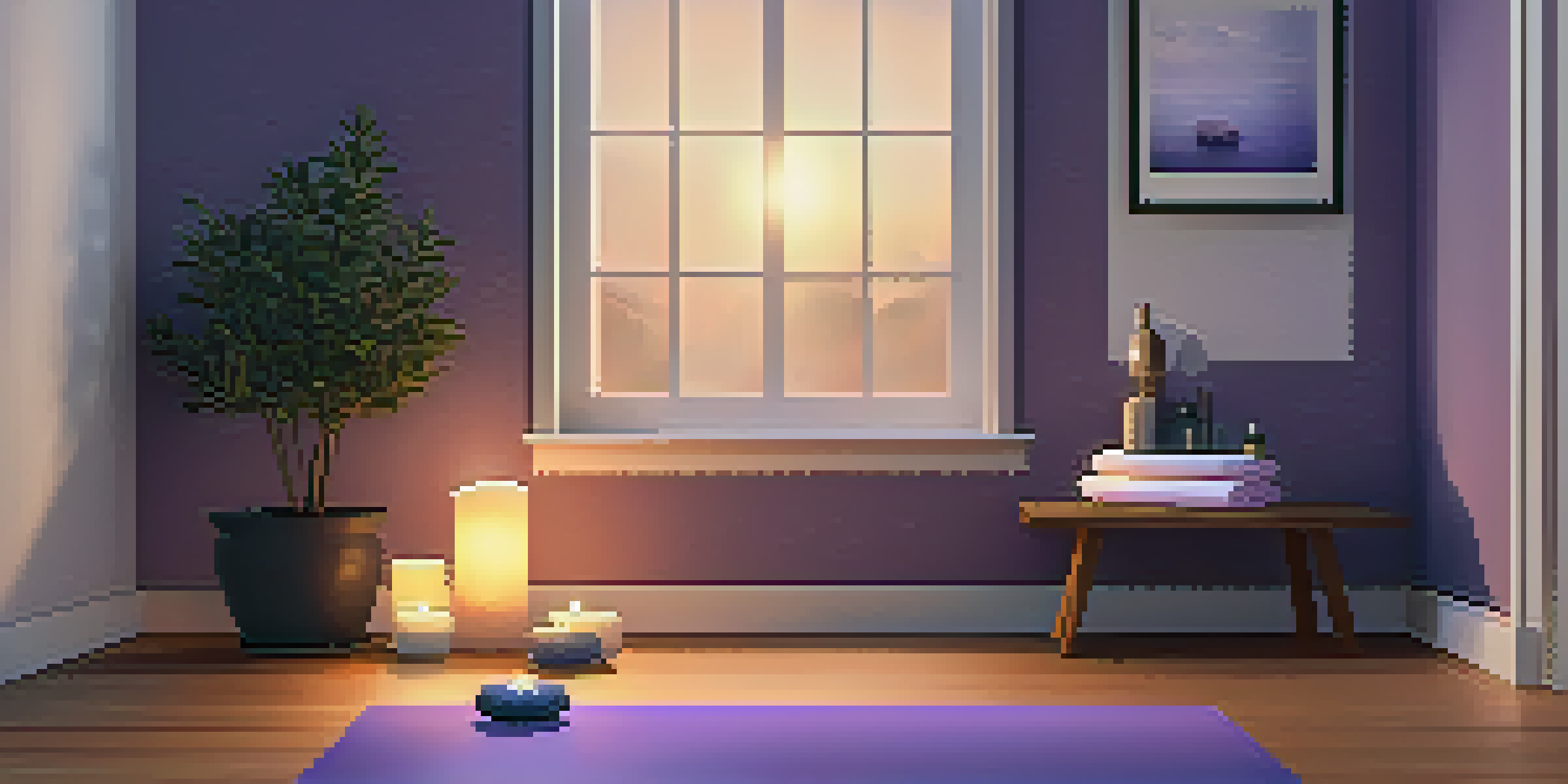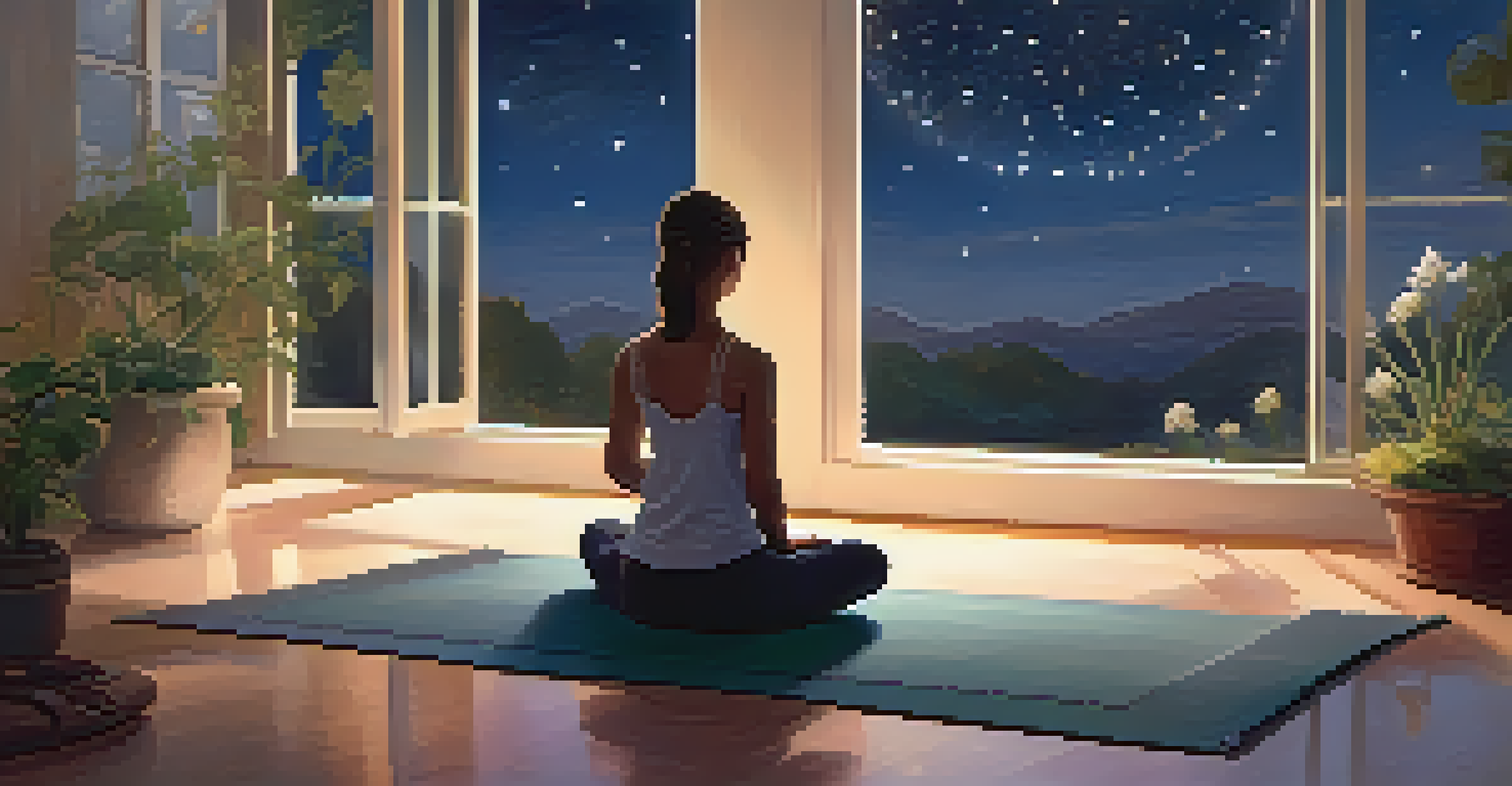Gentle Yoga Routines Perfect for Pre-Sleep Relaxation

The Benefits of Gentle Yoga Before Sleep
Engaging in gentle yoga before bedtime can significantly enhance your sleep quality. It helps to calm the mind and release physical tension accumulated throughout the day. By focusing on slow, deliberate movements and breath, you prepare your body for a restful night.
Yoga is the journey of the self, through the self, to the self.
Moreover, gentle yoga promotes relaxation by lowering cortisol levels, the stress hormone that can keep you awake. This calming effect can lead to a more peaceful mind, allowing you to drift off to sleep more easily. Think of it as a soothing lullaby for your body and mind.
Incorporating gentle yoga into your nightly routine can also improve flexibility and reduce discomfort, which can be beneficial if you tend to toss and turn at night. So, why not give your body the gentle care it craves before sleep?
Creating a Cozy Yoga Space for Relaxation
A dedicated space for your pre-sleep yoga can enhance the experience significantly. Choose a quiet corner in your home, free from distractions, where you can lay out your yoga mat. Soft lighting and calming scents, like lavender or chamomile, can create an inviting atmosphere.

Consider using props like cushions or blankets to make your practice more comfortable. This not only supports your body in various poses but also adds a layer of coziness that encourages relaxation. Imagine curling up in a warm blanket as you ease into your practice.
Gentle Yoga Enhances Sleep Quality
Engaging in gentle yoga before bed calms the mind and releases physical tension, leading to improved sleep.
Playing soft, soothing music or nature sounds can further elevate your yoga experience. This ambiance helps signal to your brain that it’s time to wind down, making it easier to transition from the busyness of the day to a state of tranquility.
Breath Awareness: The Key to Relaxation
One of the cornerstones of yoga is breath awareness, which is particularly important for pre-sleep routines. Focusing on your breath helps to center your thoughts and calm your nervous system. Try inhaling deeply through your nose and exhaling slowly through your mouth, letting go of the day's stress with each breath.
The mind is everything. What you think, you become.
This mindful breathing can create a sense of peace, allowing your body to release tension and prepare for sleep. Picture each exhale as a wave washing away worries, leaving you feeling lighter and more relaxed. It's a simple yet powerful practice that anyone can adopt.
Incorporating breath exercises into your gentle yoga routine can deepen your relaxation experience. Over time, you may find that simply engaging in breath awareness helps you unwind, even outside of your yoga practice.
Gentle Yoga Poses to Try Before Bedtime
Certain yoga poses are particularly effective for promoting relaxation before sleep. Poses like Child’s Pose, Legs-Up-The-Wall, and Seated Forward Bend can gently stretch and release tension in your body. These poses are easy to hold and help signal to your body that it’s time to unwind.
As you settle into each pose, focus on the sensations in your body and your breath. Allow yourself to melt into the ground, feeling supported and safe. This connection between body and mind is essential for finding the calm you crave at night.
Create a Cozy Yoga Space
Setting up a distraction-free and inviting space for yoga, complete with soft lighting and calming scents, enhances relaxation.
You can also try gentle twists to help release any remaining tension in your spine. These movements not only help with relaxation but can also aid digestion, making them a perfect addition to your pre-sleep routine.
Mindfulness and Meditation for Enhanced Relaxation
In addition to gentle yoga, incorporating mindfulness and meditation can further enhance your pre-sleep routine. Taking a few moments to meditate after your yoga practice allows your mind to settle and reflect on the day. This practice can help you cultivate gratitude and let go of any lingering stress.
Consider focusing on a simple mantra or visualizing a serene place where you feel at peace. This can create a mental space that encourages relaxation and prepares your mind for sleep. It’s like giving your brain a warm cup of tea before bed.
Even just five minutes of mindfulness can make a difference, helping you transition more smoothly from your day into a restful night. This practice can become a cherished part of your nightly routine, enhancing your overall well-being.
Establishing a Consistent Nightly Routine
Consistency is key when it comes to creating a pre-sleep routine that includes gentle yoga. Trying to practice at the same time each night can help signal to your body that it's time to wind down. This sense of routine can make it easier to transition into sleep and improve your overall sleep quality.
Start by setting aside just 15-20 minutes for your gentle yoga practice. As you become more comfortable, you can adjust the time to fit your needs. Think of it as a nightly appointment with yourself—a time to unwind and reconnect.
Mindfulness Boosts Relaxation
Incorporating mindfulness and meditation into your routine can deepen relaxation and prepare your mind for sleep.
Over time, you may find that this routine not only helps you sleep better but also enhances your overall sense of well-being. Just like brushing your teeth before bed, this practice can become a non-negotiable part of your evening.
Listening to Your Body: The Importance of Intuition
As you engage in gentle yoga, it's essential to listen to your body and honor its needs. Everyone's body is different, and what feels good for one person may not feel the same for another. Pay attention to how each pose feels, and don’t hesitate to modify or skip poses that don’t resonate with you.
This intuitive approach to yoga can create a more personalized and enjoyable experience. If something feels uncomfortable, it’s okay to change it up or rest. Yoga is meant to be a practice of self-care, not a chore.

By tuning into your body’s signals, you can cultivate a deeper sense of connection and awareness, which is invaluable for relaxation. This practice can empower you to make choices that best serve your well-being, both on and off the mat.